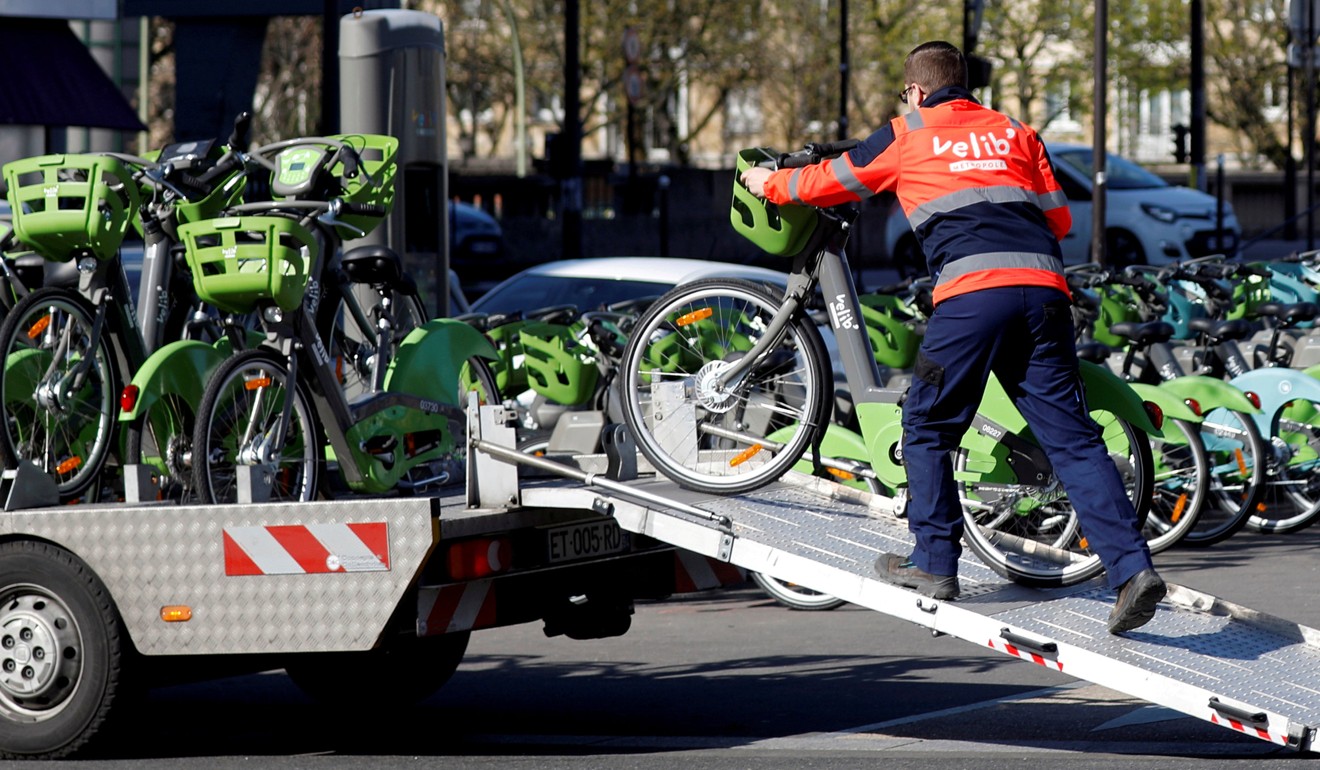
Chinese bike-sharing giants battle for Paris turf after ‘Vélib fiasco’
With the wheels falling off Paris’s once ‘full speed ahead’ public bike-sharing scheme China’s station-free rental operators are bidding to fill the void
Paris has been forced to back-pedal on its plan to become Europe’s most cyclist-friendly city by 2020 as its municipal bike-sharing network has ground to a halt due to technical issues.
The Vélib system – a portmanteau of French words vélo (“bicycle”) and liberté (“freedom”) – was launched in 2007 and successfully managed by the city until the end of 2017.
The grey bikes were once available for hire around the clock from 1,800 stations and became a familiar sight in the capital as young and old alike darted through the streets.

In 2014, the p’tit Vélib – “little Vélib” – was launched, aimed at children, and the banks of the Seine and the Bois des Boulognes forest thronged with toddlers riding the hop-on, drop-off bikes.
The queues at Vélib stations attested to the scheme’s popularity. Today, those queues have disappeared and many stations are deserted.
What Hong Kong needs for better bike-sharing
Last year, a private consortium called Smovengo won a 15-year, €600 million (US$695 million) contract to take over the Vélib fleet and upgrade it, replacing mechanical bikes with electric ones. However, the handover has proven a total failure, known as #Vélibfiasco on social media.
Glitches in the online booking app meant one-third of attempts to rent a bike from the once bustling docking stations failed and almost half the 1,200 existing stands broke down.
“The Vélib application tells people that bikes are available at a certain station, when in fact none are,” said Alexis Frémeaux, president of the “Better to Move by Bike” association.
“Since the beginning of the year, the thousands of people who choose Vélib as their main way of getting around in Paris have been really stung. Before, about half of the bikes used in Paris were Vélibs.”
According to the office of the city’s mayor, Anne Hidalgo, the average daily number of Vélib rides has plummeted from more than 100,000 to 11,000.
Thousands of cyclists have turned their backs on Vélib. Users fell from 285,000 to 190,000 in just four months. One-third of users did not renew their subscriptions.
Chinese bike-sharing firms pull 3,000 bikes out of rivers, vow to help reduce dumping
Facing heavy fines for breach of contract, Smovengo was given an ultimatum to address the problems by the end of August.
“We are stepping up pressure on the new operator,” Hidalgo said.
“This service is essential for the mobility of Parisians … we still want to create the biggest bike-sharing service in Europe.”
In response, several Chinese operators of dockless self-service bicycles have been vying to replace Vélibs. One of them, Hong Kong-based start-up Gobee.bike, ran into an obstacle within months in the form of vandalism, which also plagued Vélib.
Other operators – China’s Ofo and Mobike and Singapore’s oBike – are currently going head-to-head with Vélib, rolling out their innovative, user-friendly systems of station-free bikes that use a mobile app to unlock and pay for the bikes.
Parisian locals and tourists alike need a reliable bike-sharing system, said Etienne Hermite, managing director of Mobike France, as the city aims to triple its volume of bike travel from 5 to 15 per cent of all city trips by 2020.
As Gobee.bike packs up, is it the end of the road for bike-sharing services in Hong Kong?
“That won’t be possible relying on privately owned bikes and Vélibs,” Hermite said.
“Even with a Vélib system in good working order, you need many extra bikes as [the target] represents a jump from 200,000 to more than half a million bike trips a day.”
Where others have tried and failed, Mobike and oBike claim their bikes are better designed and more vandal-proof.
“Without tubes, chains or spokes they are fairly robust,” Hermite said. “Other than those that are thrown in the Seine, which we can’t do much about, their lifespan is about four years.”
Likewise, Laurent Kennel, general manager of Ofo France – which has rolled out 1,000 of its yellow bikes since January – said his firm’s bikes were built to last.
“The bikes offer a simple, durable and pleasant way to circulate daily,” said Kennel of the bikes that can now be geolocated with the Citymapper Paris transit app.
Why bike-sharing in crowded Hong Kong is not a good idea
Enhanced protection against vandalism will reassure critics after Hong Kong-based Gobee was accused of offering “disposable bikes”.
Late last year, the city’s administrators threatened to charge Ofo, Mobike and oBike a fee for “commercial use of public space” due to bikes being parked haphazardly, blocking public thoroughfares.
After six months of talks, the firms signed a charter of good conduct, committing them to strictly control users’ habits to guarantee fleet maintenance and remove wrecked bikes within 24 hours.
As frustration with Vélib’s glitches deepens, the Chinese firms are poised to capitalise, offering about 7,800 bikes for rent compared to Vélib’s 3,000.
Mobike is banking on Vélib’s shortcomings to win over customers. Since January, it has launched a fleet of some 5,000 of its high-visibility neon orange bikes.
“We plan to have tens of thousands of bikes in the long term,” Hermite said. “Vélib may have helped generate that demand but it goes well beyond that.
Theft, vandalism force Hong Kong bike sharing start-up Gobee to retreat from Europe
“In May we launched a new larger three-speed bike adapted to Paris roads. And we have just introduced subscription plans offering unlimited journeys for a month, three months, a year.
“The challenge now is to build on those services, for example by offering electric bikes, which are being tested in China. A small battery is sold to the client, and allows you to do 15km.”
These foreign bike-sharing firms may be able to breathe new life into Paris’s vision of a pedal-powered future. But as it stands, Vélib’s promise of “bike freedom” rings hollow to the thousands of disenchanted riders who once relied on the bikes to commute and now find themselves at a virtual standstill.

